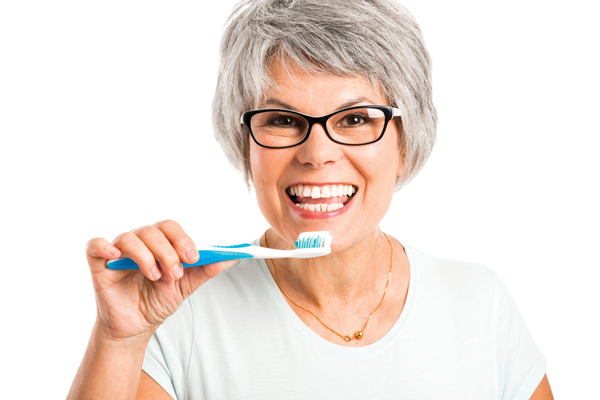A Healthy Mouth = A Happier You
Tips for Reducing the Oral Side Effects of Chemotherapy
by Jill Meyer-Lippert, RDH
While not everyone experiences problems in their mouth during chemotherapy, many cancer survivors do. Some of the oral side effects associated with cancer therapies include dry mouth, mouth sores (or oral mucositis), and osteonecrosis of the jaw. For some cancer survivors, long-term damage to teeth and gum health can occur. This may require time-consuming and costly dental care long after cancer treatments are complete.
So, what can you do?
Ideally, cancer survivors should be referred for dental care before cancer treatments begin. Proactively removing plaque and tartar buildup, cavities, and infection can drastically reduce your risk of oral complications during cancer treatment. In addition, all cancer survivors should take steps to improve their oral hygiene before, during, and after cancer treatment.
Don’t wait to make changes to your oral hygiene routine. It is more difficult to get oral side effects under control once they’ve started.
If you’ve been diagnosed with cancer, here are some things you can start doing today to safeguard your oral health:
- Gently brush your teeth, using small circular strokes, three to four times a day for two to three minutes to reduce bacterial plaque build-up. Using an extra- soft, compact-head toothbrush helps reduce the risks of trauma and makes brushing more comfortable if your mouth tissue has become sore or ulcerated.
- Use toothpaste free of sodium lauryl sulfate, which can cause irritation. Peroxide, tartar control, and whitening ingredients can also dry and irritate mouth tissue, making mouth sores more likely.
- Ask your dental professional to demonstrate the proper “C-curve” flossing technique to remove food particles and plaque build-up between your teeth each day while avoiding trauma to gum tissue. If your blood counts drop too low, your oncologist may suggest avoiding flossing altogether or altering your technique until your counts return to a safer lever.
- Warm salt water and baking soda rinses can help to soothe tender oral tissue. While recipes vary, common recommendations include rinsing four to six times a day with one of the following:
- 1⁄4 tsp. salt in 8 ounces of water
- 1⁄4 tsp. baking soda in 8 ounces of water
- 1 tsp. salt and 1 tsp. baking soda in 4 cups water
- Avoid mouth rinses containing alcohol, phenol, or peroxide, as they can be too harsh and drying for oral tissue.
- Keep your lips moisturized using a petroleum-free lip balm.
- Clean dentures or removable partials thoroughly each day, and soak in water or a denture cleaner overnight. Gently brush the gum tissue under the dentures daily, or wipe with moistened gauze to remove plaque. See your dentist at the first sign of discomfort or if a sore develops.
- Combat dry mouth by drinking at least eight glasses of water each day and avoiding caffeine, alcohol, and tobacco.
- Stimulate saliva production with sugar-free gum and mints sweetened with xylitol. Xylitol is a natural sugar substitute that helps to prevent cavities. In addition, the sweet taste encourages saliva production.
- Make sure you are using dry mouth remedies that are researched and recommended by a trusted dental professional. Unfortunately, some dry mouth products are acidic, and while they may mask your discomfort, they also may contribute to tooth damage.
Make your mouth a priority.
Don’t wait to make changes to your oral hygiene routine. It is more difficult to get oral side effects under control once they’ve started. Being proactive can help to minimize their severity, and maybe even prevent oral side effects from occurring.
With the approval of your oncologist, resume regular dental visits every three to six months, depending on your individual needs. This provides opportunities to find and repair any problems as early as possible, which can help keep dental treatment conservative. Your dentist or dental hygienist can also apply prescription strength fluoride to help keep your teeth strong.
Protecting your oral health means more than just ensuring you have a pretty smile. Taking steps to keep your mouth healthy helps to reduce your risk of pain, infection, and expensive dental work even years after your cancer treatments are complete.

Jill Meyer-Lippert is a registered den- tal hygienist, a community relations manager with Custom Dental Solutions (CustomDentalSolutions.com), and the founder of Side Effect Support LLC (SideEffectSupport.com), which is dedicated to helping cancer survivors manage short- term oral side effects and long-term damage to oral health associated with treatments. She is a member of the Registered Dental Hygienist Advisory Board for the Oral Cancer Foundation and part of the Triage Cancer Speakers Bureau.
This article was published in Coping® with Cancer magazine, September/October 2020.


